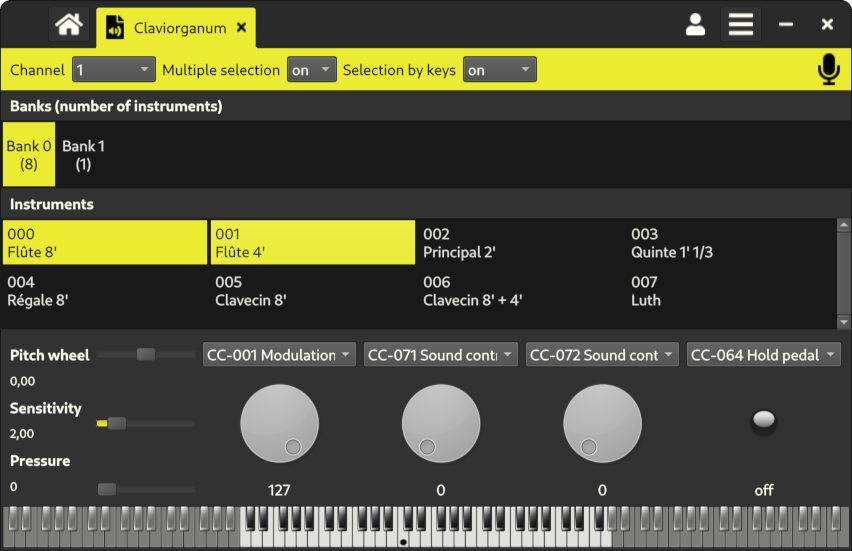Article category
Software
Date
Version 2.4
The emphasis in version 2.4 is on playability. Polyphone is now a fully functional synthesizer, and a number of changes have been made for playing soundfonts or imported files with precision and musicality.
Using Polyphone as a synthesizer
By opening Polyphone with the -s option (see this page for more details), all files will be loaded in read-only mode and MIDI channels can be assigned for playing them with an external MIDI keyboard. It is also possible to activate or deactivate the soundfont presets using the lowest notes. So, if your MIDI keyboard includes pads, you can configure them to select the preset(s) you wish to play.

For a better compatibility with MIDI hardware:
- relative MIDI CC values are supported (for “endless” type knobs sending values around 0 or 64 only);
- possibility of connecting a MIDI keyboard while Polyphone is in use (no need to restart);
- the support for sustain and sostenuto pedals has been fixed.
Moreover:
- the sound engine is now faster and more accurate: you can play more sounds than before;
- when loading a soundfont including modulators, the default value of the MIDI controllers involved is consistently set to 0, 64 or 127.
File support
SFZ format
More opcodes can be imported and exported: amp_veltrack, fil_veltrack, fil_keytrack, fil_keycenter. They are translated into soundfont modulators and the first two opcodes are particularly important for pianos, as they add velocity-based expressivity.
The handling of pan / width and position opcodes during import / export is now more accurate.
Grand Orgue format
The Grand Orgue format also features improved support:
- instruments are grouped by preset if switches are defined;
- a new “release” playback mode is used to play samples when a key is released (see below);
- the end of samples, if specified in the disposition, is read.
Grand Orgue files can now be processed with the export command line.
Ergonomics
General
For saving space on the screen, the window borders are now an option.

To navigate between tabs, it is possible to use:
- Ctrl+Tab to display the next tab - excluding the home tab;
- Ctrl+Shift+Tab to display the previous tab - excluding the home tab;
- Ctrl+H to display the home page.
Preset level
Selecting a preset or preset divisions displays the key ranges of the corresponding instruments on the keyboard. No surprises when using a key: no sound if the key is grayed out.

Miscellaneous
Sample mode “release”
A new sample mode has been introduced for reading a sample when a key is released (the 3rd element in the list below).

The “release” sample mode uses the same volume envelope as all the other sample modes, but the difference lies in the sample playback that begins with the release phase. At this point, a very short attack of 0.02s is used to smooth the arrival of a wave that might not start with a 0 value.
Please note: this sample mode is not documented in the current 2.04 soundfont specifications, and other synthesizers may not support it. FluidSynth supports this feature from version 2.4.0 onwards.
Translation
Special thanks to David Surroca and Spessassus who kindly translated Polyphone into Catalan and Polish.
If you too would like to complete / correct / create a translation, please consult this page and don′t hesitate to contact the developer.
Polyphone is free but there are costs associated with its website and development. A small donation will help a lot.
Donatetop